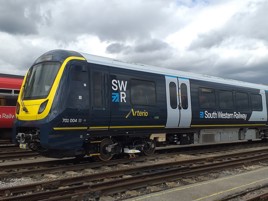Driver training has finally started on South Western Railway’s long-delayed fleet of 90 Class 701 Arterio trains.
The fleet of Derby-built trains has largely been in storage, with just a few units working a limited service since January between London Waterloo and Windsor.
Now agreement has been reached with drivers’ union ASLEF, 700 drivers will undertake eight-day conversion courses.
An SWR spokesperson told RAIL: “Unlocking the start of driver training is the result of months of hard work and marks a significant milestone that clears the way for the full introduction of the Arterio fleet.
“We will now work closely with all our partners to deliver our training course and begin the phased rollout plan for the fleet in the coming months.”
SWR said that would mean more trains entering passenger service in late summer and early autumn.
The trains are due to operate on all suburban routes from Waterloo.
The £1 billion fleet of Class 701 trains were ordered to enter service in 2019, and are now five years late. They were built at Litchurch Lane by Bombardier, which was subsequently taken over by Alstom.
Most of the delays were no fault of the train operator, but the failure to reach agreement on driver training has added to those delays.
Most trains had been delivered and accepted by SWR at the end of last winter. Then, significant issues with the stability of the train control and management system, TCMS, were still unresolved. Parts of the system would trigger alarms inconsistently across the fleet.
Trains have been stabled wherever space can be found. SWR only has spare sidings for a dozen Arterios across its network, so vehicles were moved to Long Marston, Eastleigh, Marchwood and elsewhere.
For four years, RAIL reported a series of ongoing safety concerns and technical challenges. Unions were unhappy with the cab design and with the equipment used by guards.
In 2022 ASLEF wrote to drivers that one train at Wimbledon depot was found to have 90 separate faults. This included 60 generic faults across the whole fleet, and 30 individual faults specific to that unit.
Faults included the coupling and uncoupling process, issues with windscreen wipers, traction converter cases and cab doors that proved difficult to open.
SWR has continued to operate a mixed suburban fleet of Class 455/6 and Class 458 trains to fill the timetable where the Arterios had been planned.
But the impact was largely masked by the lingering impact of Covid: recovery of passenger numbers on SWR suburban lines has been slower than on other operators. SWR attributed that to a larger proportion of office-based commuters into central London in its catchment: the cohort of people who are now most able to work from home for at least part of the week.
The new trains will be a step-change in passenger experience, with air conditioning, toilets and improved information systems.
















Login to comment
Comments
No comments have been made yet.